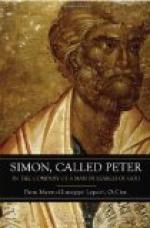They both of them bathed in the performance. The possible and impossible scenes came and went in a bewildering variety, till one had the feeling that one was asleep and dreaming the incomprehensible jumble of a dream, and, as in a nice dream, one knew it was absurd, but did not care. The magnificent, brilliant staging dazzled till one lay back in one’s chair and refused to name the colours to oneself or admire their blending any more. The chorus-girls trooped on and off till they seemed countless, and one abandoned any wish to pick the prettiest and follow her through. And the gay palace of luxury, with its hundreds of splendidly dressed women, its men in uniform, its height and width and gold and painting, and its great arching roof, where, high above, the stirring of human hearts still went on, took to itself an atmosphere and became sentient with humanity.
Julie and Peter were both emotional and imaginative, and they were spellbound till the notes of the National Anthem roused them. Then, with the commonplaces of departure, they left the place. “It’s so near,” said Julie in the crowd outside; “let’s walk again.”
“The other pavement, then,” said Peter, and they crossed. It was cold, and Julie clung to him, and they walked swiftly.
At the entrance Peter suggested an hour under the palms, but Julie pleaded against it. “Why, dear?” she said. “It’s so cosy upstairs, and we have all we want. Besides, the lounge would be an anti-climax; let’s go up.”
They went up, and Julie dropped into her chair while Peter knelt to poke the fire. Then he lit a cigarette, and she refused one for once, and he stood there looking into the flame.
Julie drew a deep sigh. “Wasn’t it gorgeous, Peter?” she said. “I can’t help it, but I always feel I want it to go on for ever and ever. Did you ever see Kismet? That was worse even than this. I wanted to get up and walk into the play. These modern things are too clever; you know they’re unreal, and yet they seem to be real. You know you’re dreaming, but you hate to wake up. I could let all that music and dancing and colour go on round me till I floated away and away, for ever.”
Peter said nothing. He continued to stare into the fire.
“What do you feel?” demanded Julie.
Peter drew hard on his cigarette, and then he blew out the smoke. “I don’t know,” he said. “Yes, I do,” he added quickly; “I feel I want to get up and preach a sermon.”
“Good Lord, Peter! what a dreadful sensation that must be! Don’t begin now, will you? I’m beginning to wish we’d gone into the lounge after all; you surely couldn’t have preached there.”
Peter did not smile. He went on as if she had not spoken, “Or write a great novel, or, better still, a great play,” he said.
“What would be the subject, then, you Solomon, or the title, anyway?”




